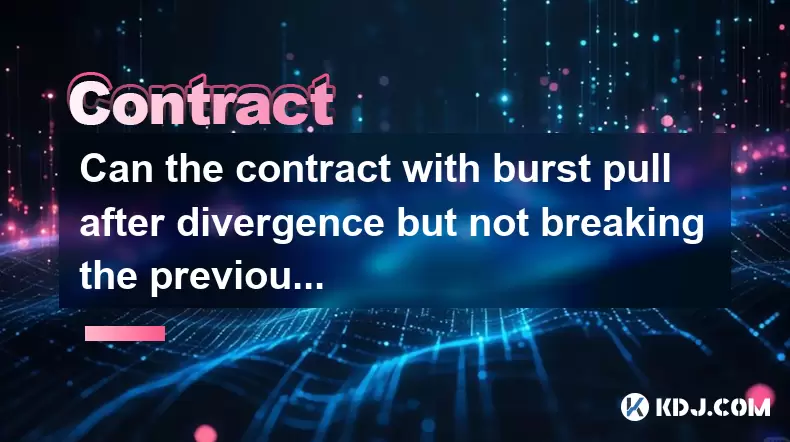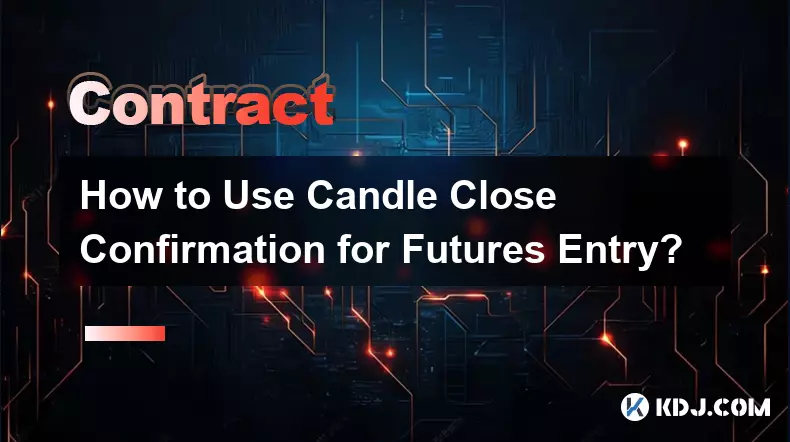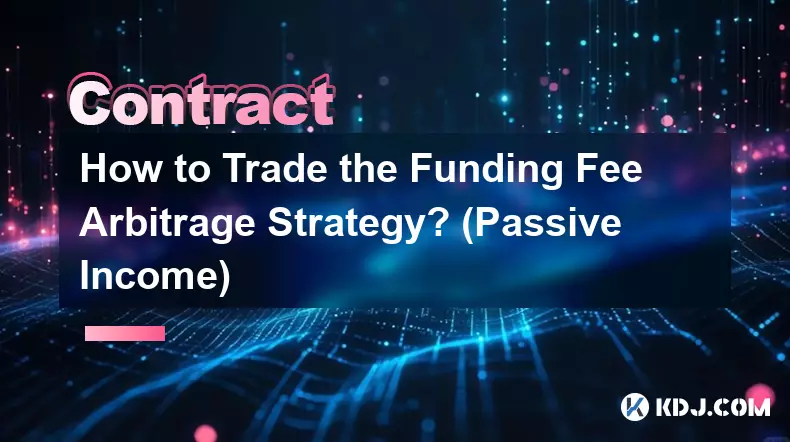-
 bitcoin
bitcoin $87959.907984 USD
1.34% -
 ethereum
ethereum $2920.497338 USD
3.04% -
 tether
tether $0.999775 USD
0.00% -
 xrp
xrp $2.237324 USD
8.12% -
 bnb
bnb $860.243768 USD
0.90% -
 solana
solana $138.089498 USD
5.43% -
 usd-coin
usd-coin $0.999807 USD
0.01% -
 tron
tron $0.272801 USD
-1.53% -
 dogecoin
dogecoin $0.150904 USD
2.96% -
 cardano
cardano $0.421635 USD
1.97% -
 hyperliquid
hyperliquid $32.152445 USD
2.23% -
 bitcoin-cash
bitcoin-cash $533.301069 USD
-1.94% -
 chainlink
chainlink $12.953417 USD
2.68% -
 unus-sed-leo
unus-sed-leo $9.535951 USD
0.73% -
 zcash
zcash $521.483386 USD
-2.87%
Can the contract with burst pull after divergence but not breaking the previous high be shorted?
Divergence in crypto trading signals potential reversals; a burst pull not breaking highs may suggest shorting, but consider volume and market sentiment first.
May 31, 2025 at 08:29 am

Understanding the Concept of Divergence in Cryptocurrency
In the world of cryptocurrencies, divergence is a critical technical analysis tool used by traders to predict potential price reversals. Divergence occurs when the price of an asset moves in the opposite direction of a technical indicator, such as the Relative Strength Index (RSI) or the Moving Average Convergence Divergence (MACD). This discrepancy can signal that the current trend is weakening and may soon reverse. When considering whether to short a contract with a burst pull after divergence but not breaking the previous high, it's essential to understand the nuances of this scenario.
Identifying Divergence in the Market
To identify divergence, traders typically look at the price chart alongside an indicator. For example, if the price of a cryptocurrency makes a new high but the RSI fails to reach a new high, this is considered bearish divergence. Conversely, if the price makes a new low but the RSI does not, this is bullish divergence. In the case of a contract with a burst pull after divergence, the price may have experienced a sharp movement (burst) following the divergence, but it did not break the previous high. This situation can create a complex trading environment where the potential for shorting needs careful consideration.
Analyzing the Burst Pull Phenomenon
A burst pull refers to a sudden and significant price movement following a period of divergence. This can be a reaction to the divergence signal, where the market attempts to correct the discrepancy between the price and the indicator. However, if the price does not break the previous high after this burst pull, it might indicate that the bullish momentum is waning. This scenario can be particularly intriguing for traders looking to short the market, as it may suggest that the price is about to reverse and decline.
Factors to Consider Before Shorting
Before deciding to short a contract with a burst pull after divergence but not breaking the previous high, several factors need to be considered. Volume is a crucial indicator to assess the strength of the burst pull. If the volume during the burst pull is low, it might indicate a lack of conviction in the price movement, making it more likely for the price to reverse. Market sentiment and news events can also influence the decision to short, as these can cause sudden shifts in the market's direction. Additionally, support and resistance levels should be analyzed to understand potential price barriers that could affect the shorting strategy.
Technical Indicators for Confirming Shorting Opportunities
To confirm whether a contract with a burst pull after divergence but not breaking the previous high should be shorted, traders often rely on additional technical indicators. The Moving Average Convergence Divergence (MACD) can be used to confirm bearish signals, especially if the MACD line crosses below the signal line after the burst pull. The Bollinger Bands can also provide insights into volatility and potential price reversals. If the price touches the upper Bollinger Band and then pulls back without breaking the previous high, it might be a strong signal to consider shorting.
Risk Management Strategies
When contemplating shorting a contract with a burst pull after divergence but not breaking the previous high, risk management is paramount. Traders should set stop-loss orders to limit potential losses if the market moves against their position. A common practice is to place the stop-loss just above the recent high, as breaking this level could invalidate the shorting thesis. Additionally, position sizing should be carefully considered to ensure that any potential loss does not significantly impact the overall trading portfolio. Traders may also use trailing stops to lock in profits as the price moves in their favor.
Executing the Shorting Strategy
If all factors align and the decision is made to short a contract with a burst pull after divergence but not breaking the previous high, the execution of the strategy requires precision. Here are the steps to follow:
- Choose the right trading platform: Ensure that the platform you use supports short selling and has the necessary tools for technical analysis.
- Monitor the price closely: Keep a close eye on the price action, especially after the burst pull, to confirm the shorting signal.
- Place the short order: Once the signal is confirmed, place the short order at the current market price or use a limit order to enter at a specific price.
- Set the stop-loss: Immediately after placing the short order, set the stop-loss just above the recent high to manage risk.
- Monitor the trade: Continuously monitor the trade to adjust the stop-loss or take profits as the market moves in your favor.
Frequently Asked Questions
Q: How can I differentiate between a false divergence and a true divergence signal?A: To differentiate between a false and true divergence, consider the strength of the price movement and the volume accompanying it. A true divergence often comes with higher volume and a more significant price movement, whereas a false divergence may lack these characteristics. Additionally, waiting for confirmation from other technical indicators, such as the MACD or Bollinger Bands, can help validate the divergence signal.
Q: What are the potential risks of shorting based on divergence signals?A: Shorting based on divergence signals carries several risks, including the possibility of the price continuing to rise despite the divergence, leading to losses if the stop-loss is not properly set. Market volatility can also cause sudden price movements that may trigger stop-losses prematurely. Additionally, external factors such as news events or regulatory changes can impact the market unexpectedly, increasing the risk for short positions.
Q: Can divergence signals be used for long-term trading strategies?A: While divergence signals are often used for short-term trading due to their focus on immediate price reversals, they can also be applied to long-term strategies. For long-term trading, traders might look for divergences on higher timeframes, such as weekly or monthly charts, to identify more significant trend reversals. However, long-term traders should combine divergence signals with other fundamental analysis tools to make informed decisions.
Q: How do I combine divergence signals with other technical analysis tools for a more robust trading strategy?A: To create a more robust trading strategy, combine divergence signals with other technical indicators such as trend lines, Fibonacci retracement levels, and moving averages. For instance, if a bearish divergence is identified, look for the price to break below a key support level or a moving average to confirm the bearish signal. Additionally, using multiple timeframes can provide a clearer picture of the market's direction and help validate the divergence signal.
Disclaimer:info@kdj.com
The information provided is not trading advice. kdj.com does not assume any responsibility for any investments made based on the information provided in this article. Cryptocurrencies are highly volatile and it is highly recommended that you invest with caution after thorough research!
If you believe that the content used on this website infringes your copyright, please contact us immediately (info@kdj.com) and we will delete it promptly.
- Big Apple Bites: While Ethereum Grapples, DeepSnitch AI Whispers of a 1000x Run
- 2026-02-07 06:30:02
- Token cat appointments furong tian to lead audit Amdst Strategic Reshffle
- 2026-02-07 06:40:01
- Brent Key Forges Georgia Tech's "Bully Ball" Identity, Reshaping ACC Competitiveness
- 2026-02-07 07:10:01
- Bithumb's Bitcoin Flash Crash: Billions in Error, Millions in Losses
- 2026-02-07 07:10:01
- Stock Strategy, Market Collapse, and Rebound: Navigating the Bitcoin Rollercoaster
- 2026-02-07 07:05:01
- Metaplanet Faces Mounting Pressure as Bitcoin Dives, CEO Affirms Unwavering Accumulation Strategy
- 2026-02-07 04:15:01
Related knowledge

How to Use Price Action Trading for Crypto Perpetual Contracts?
Feb 06,2026 at 03:20pm
Understanding Price Action Fundamentals1. Price action trading relies entirely on raw market data—candlestick formations, support and resistance level...

How to Trade Crypto Contracts on Your Mobile App? (Full Tutorial)
Feb 07,2026 at 02:59am
Setting Up Your Mobile Trading Environment1. Download the official mobile application from the exchange’s verified website or trusted app store listin...

How to Manage Emotions and "Revenge Trading" in Futures?
Feb 05,2026 at 12:19am
Understanding Emotional Triggers in Futures Markets1. Market volatility directly impacts psychological states, often amplifying fear or euphoria based...

How to Use Candle Close Confirmation for Futures Entry?
Feb 05,2026 at 04:20pm
Understanding Candle Close Confirmation1. A candle close confirmation occurs when the final price of a candlestick settles beyond a predefined level, ...

How to Trade the Funding Fee Arbitrage Strategy? (Passive Income)
Feb 07,2026 at 06:20am
Funding Fee Arbitrage Mechanics1. Funding fees are periodic payments exchanged between long and short traders on perpetual futures exchanges, typicall...

How to Master "Position Sizing" to Prevent Total Account Wipeout?
Feb 06,2026 at 12:00am
Market Volatility Patterns1. Bitcoin price swings often exceed 10% within a 24-hour window during high-liquidity events such as ETF approval announcem...

How to Use Price Action Trading for Crypto Perpetual Contracts?
Feb 06,2026 at 03:20pm
Understanding Price Action Fundamentals1. Price action trading relies entirely on raw market data—candlestick formations, support and resistance level...

How to Trade Crypto Contracts on Your Mobile App? (Full Tutorial)
Feb 07,2026 at 02:59am
Setting Up Your Mobile Trading Environment1. Download the official mobile application from the exchange’s verified website or trusted app store listin...

How to Manage Emotions and "Revenge Trading" in Futures?
Feb 05,2026 at 12:19am
Understanding Emotional Triggers in Futures Markets1. Market volatility directly impacts psychological states, often amplifying fear or euphoria based...

How to Use Candle Close Confirmation for Futures Entry?
Feb 05,2026 at 04:20pm
Understanding Candle Close Confirmation1. A candle close confirmation occurs when the final price of a candlestick settles beyond a predefined level, ...

How to Trade the Funding Fee Arbitrage Strategy? (Passive Income)
Feb 07,2026 at 06:20am
Funding Fee Arbitrage Mechanics1. Funding fees are periodic payments exchanged between long and short traders on perpetual futures exchanges, typicall...

How to Master "Position Sizing" to Prevent Total Account Wipeout?
Feb 06,2026 at 12:00am
Market Volatility Patterns1. Bitcoin price swings often exceed 10% within a 24-hour window during high-liquidity events such as ETF approval announcem...
See all articles










































































